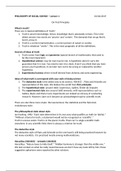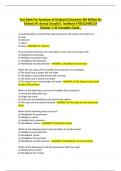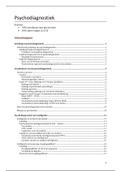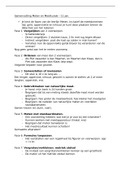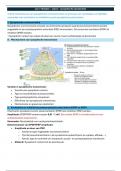On First Principles
What is truth?
There are 3 classical definitions of ‘truth’:
1. Truth is proven knowledge, hence, knowledge that is absolutely certain. This is the
oldest answer; key words are ‘proven’ and ‘certain’. This demands that we go find it,
test it, prove it.
2. Truth is a correct representation, a correct picture of nature or society.
3. Truth is whatever “works”. This is the most pragmatic of all the definitions.
Sources of ideas of truth
1. Truth comes from logic and geometry (special branch of mathematics that used to
be the most important)
2. Hypothetical science: may be true may be not. A hypothesis doesn’t carry the
guarantee that it is true. You need to test it to check. Even if you think that you have
proven your hypothesis, it can later turn out to be wrong or replaced by another
hypothesis.
3. Experimental science which is itself derived from alchemy and early engineering
Ideas of what truth is correspond with your style of doing science
1. The deductive style is the oldest way to do science, 400 BCE -. Plato and Aristotle are
representative of this style. We deduce the world from first principles.
2. The hypothetical style; around 1600. Copernicus, Galileo, Émilie du Chatalet.
3. The experimental style also around 1600 onwards; with representatives such as
Galileo, Boyle and Marie Curie. Experiments are indeed an old way of conducting
research. However, later on it became an acknowledged road to scientific truth.
There are also three more styles: the taxonomical, the statistical and the historical-
evolutionary style.
The philosophical claim about style
Ian Hacking, 1982: “Each style determines in its own way what qualifies as truth (or falsity).”
“Without criteria for truth, a statement would not be recognized as ‘scientific’.”
Truth in science exists. Truth is in the plural, truths. There isn’t a single scientific truth.
Anywhere, in any scientific field, there is always a criterion for truth.
The deductive style
The deductive style of Plato and Aristotle on the one hand is still being practiced however by
not many scientists. It is practiced mostly among mathematicians.
Heraclitus (500 BCE) – Aristotle (340 BCE)
Heraclitus: “Nature loves to hide itself.” “Hidden harmony is stronger than the visible one.”
We lack context on what he really meant because we don’t have any texts left by him; these
suggestive aphorisms were reported by other scholars.
,Aristotle provided a sort of explanation of what Heraclitus meant. His explanation became
very influential.
“The most universal concepts are the furthest removed from perception.” (Aristotle)
There is perception (stuff that we see); however, what is really important in scientific
knowledge is what is behind what we see, not really what we see. So, again this notion of
hidden nature.
Two candidates for hidden nature:
ATOMS (Democritus, Epicurus, Lucretius): they could be the hidden building blocks.
They are concrete.
FIRST PRINCIPLES or axioms: Parmenides, Pythagoras, Plato, Aristotle, Euclid,
Archimedes; they all worked on the idea that hidden nature is not something
concrete like atoms but abstract like first principles.
In Ancient Greece, first principles won the debate.
The style of reasoning from first principles
This style originated in a culture different from our own. Plato was an aristocrat, opposed to
Athenian democracy. Plato wanted truth to be independent of political bargain: we cannot
find a philosophical truth in a debate amongst ourselves. Real truth is to be found
elsewhere; but where do find the source of truth then?
Plato, Aristotle and geometry
Knowing math was a requirement to enter Plato’s Academy as a student. Plato: “every soul
has an instrument of knowledge that is purified and kindled by the study of mathematics.”
Those who don’t know mathematics, don’t enter. In fact, Plato required his students to have
a deep knowledge of mathematics before he could teach them philosophy.
Euclid’s Elements (300 BCE) is one of the most famous books in the world after the Bible.
Earlier versions of the Elements circulated in Athens during Aristotle’s stay there. The
Elements is deductively structured hence (mathematical) proof. Strength of geometric
proof; absolute certainty.
Axioms are equivalent to first principles. Axioms are the simplest theorems, the end point,
the simplest geometric pronouncement. All the theorems in geometry are built on axioms
which in turn cannot be proven. Axioms cannot rely on simpler axioms because they don’t
exist. Where is certainty then? If all geometry rests on something that can’t be proved.
Axioms cannot be proved yet they are true and must be so. Axioms are not assumptions
though. They should give the foundations of everything else but they can’t be proved.
Therefore, we need to derive it from somewhere else.
Plato/Aristotle: everything originates in ”a One”
Equivalent to the axioms are first premises (principles; for Plato, ideas or forms) from which
we derive conclusions which lead to logic (Aristotle). From axioms we derive theorems
which are the basis of geometry.
Who is the very first cause? God. According to Aristotle, God is a point in space and time.
From God, through the lower God the Demiurge, we derive the world of causal chains.
, How do we acquire first principles? Where is our ability to recognize the truth of axioms
coming from?
Plato’s Timaeus provides an account of the creation of the world by the Demiurge (lower
God). On the basis of the forms (ideas), the Demiurge creates the world and creates humans
who are instilled with a bit of ‘world soul’. The Demiurge invited humankind to sit on a cart
and takes them around explaining abstractly the cosmos and how the world is created.
Therefore, they have some basis of understanding in them.
Plato believed in reincarnation: after you die, your soul goes back to the underworld, to the
world soul, and your soul will then go to another person. Therefore, everyone has inside
them a bit of the original soul of the first people created by the Demiurge and their
knowledge.
Plato’s Meno further talks about this and adds the notion of recollection: we need to
reactivate the knowledge that we already have inside our soul (mind). Recollection of what
the Demiurge had explained to the first humans.
Aristotle, instead, didn’t believe in recollection but he argued that there is a correspondence
between nous in the world (the world soul) and nous in the psyche: the soul that we have is
the same as the world soul. Nous here means soul, but also comprehension and INTUITION
= part of your soul that has been instructed by the Demiurge. Aristotle thought that intuition
was infallible.
Aristotle Posterior Analytics
The intellectual faculties which grasp first principles arise from sense-perception, just as,
when a retreat has occurred in battle, if one man halts than so does another, until the
original position is restored. The soul is so constituted that it is capable of the same sort of
process. Analogy between the phalanx and scientific knowledge that we derive from
observation. Soldiers knew blindly their positions in the phalanx.


